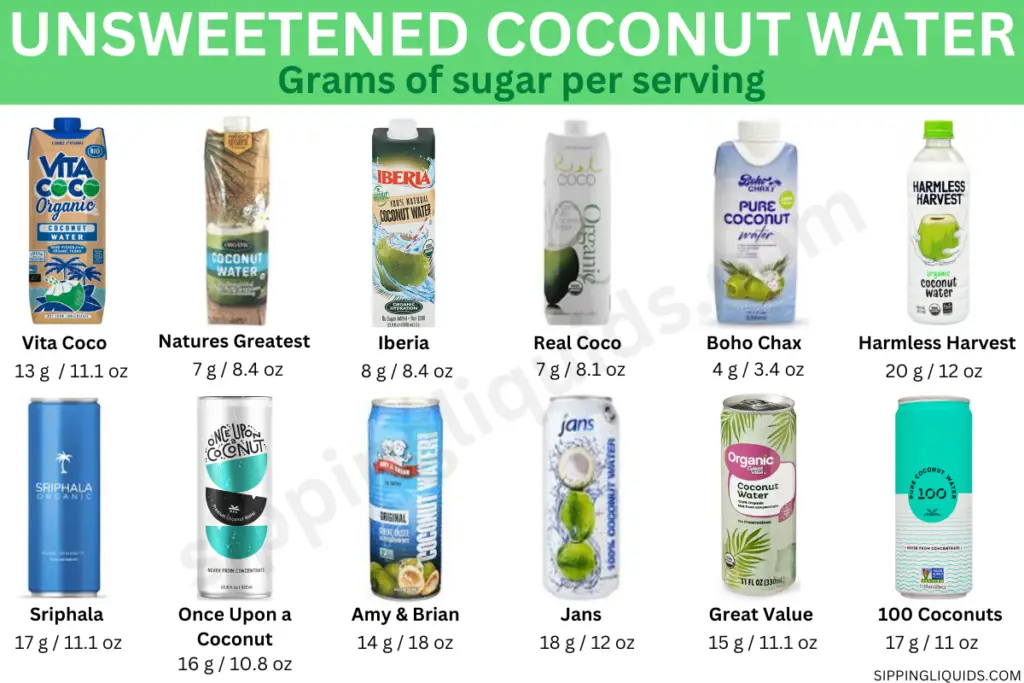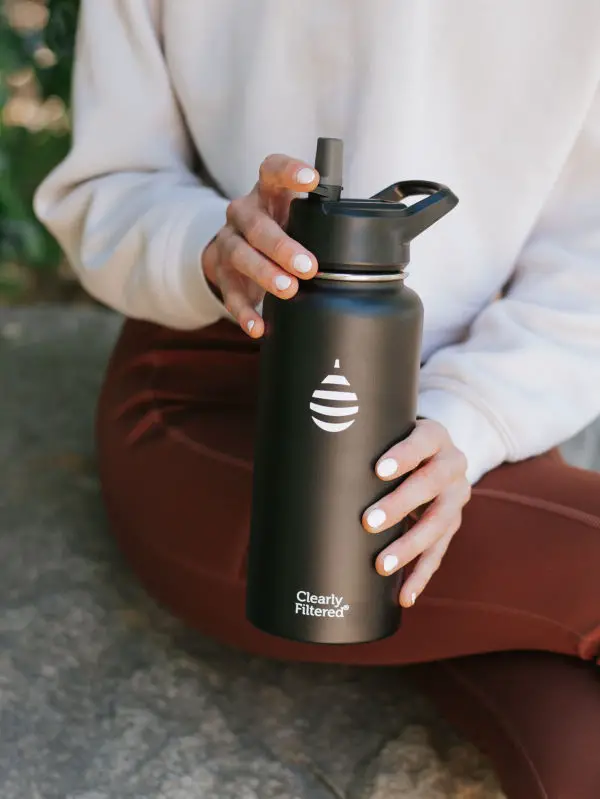Coconut water, a widely popular beverage known for its natural hydration benefits, may surprise you with its sugar content.
Coconut water is high in simple sugars, especially sucrose, glucose and fructose. An 11 oz serving contains between 7 and 20 grams of sugar. Yet it is generally considered a low sugar beverage, especially when marketed against sport drinks and sodas with high sugar content.
This article explores the nutritional profile of coconut water, emphasizing its sugar content and the difference between young and mature coconut water. We also highlight coconut water brands without added sugars, and discuss how coconut water affects blood sugar and blood pressure.
- Coconut water is naturally high in sugars, but contains far less sugar than an average soda.
- Young coconut water contains almost half the amount of sugar as mature green coconut water.
- Most sugar in coconut water is sucrose, glucose and fructose.
Natural Sugars in Coconut Water
Coconut water comes from the liquid part of the coconut fruit.
It is different to coconut milk, which is made by grating the solid part of the coconut fruit or kernel, with water often added.
While coconut milk is used as a food ingredient for cooking, we drink coconut water directly as a slightly sweet beverage with a subtle (and delicious) nutty flavor.
The amount of sugar in it depends on how mature the coconut fruit is, with coconut water classified as either tender (young) or mature.
Tender (Young) coconut water
Young coconut water is generally used as a natural drink that is low in calories and fat, but rich in beneficial minerals, such as:
- Sodium
- Potassium
- Phosphorus
- Chloride
- Magnesium,
It is also high in vitamins, sugars, proteins, free amino acids, antioxidants, and cytokines (a type of protein that affects our immune system).
Some of these nutrients are considered electrolytes, which is why coconut water is often marketed as an energy or sports drink.
Tender coconut water (or TCW) that has been fermented from green coconuts is said to have a variety of health benefits which include antioxidant, antimicrobial, anticancer, cardioprotective, antithrombotic, antibacterial, hepatoprotective, immunostimulatory and even antidiabetic activity.
Mature coconut water
Mature coconut water (MCW), on the other hand, is sometimes discarded, although it contains many health properties that are currently being researched.
This type of coconut water is hard to find, which may be a good thing as it has more than double the amount of sugar than young coconut water.
The amount of glucose substantially increases as the coconut fruit ripens.
Unsweetened coconut water
The natural sugars found in unsweetened coconut water are:
- Sucrose
- Glucose
- Fructose
- Galactose
- Xylose
- Mannose
*Note: see the table below for the average amount of sugar in tender (young) vs mature coconut water.
Sucrose, glucose and fructose make up almost all of the sugars in unsweetened coconut water, with the others listed above only accounting for a tiny amount.
In fact, while coconut water contains proteins, salts and a very small quantity of oil, it is mostly water (H2O) with sugars.
These sugars generally provide around 50 calories and a low glycemic level.
Still, coconut water is rich in simple sugars, which is why it is best drunk before and after exercise, giving the body a fair opportunity to metabolize these simple carbohydrates.
| Sugars | Young Coconut Water | Mature Coconut Water |
| Sucrose | 7.2 mg/mL | 15.2 mg/mL |
| Glucose | 0.5 mg/mL | 6.9 mg/mL |
| Fructose | 3.3 mg/mL | 4.6 mg/mL |
| Total | 3.4 mg/mL | 3.6 mg/mL |
Sugar Content in Major Coconut Water Brands

Many popular brands of coconut water contain additives and flavoring agents that change the nutritional value and sugar content. These are known as “sweetened coconut waters”.
Some also use sweeteners, which sound healthy and natural but are digested in the body as simple sugars.
- This is the case with products like Bai Coconut Flavored Water which has a low glycemic index but still contains added Stevia which is a non-nutritive sweetener.
- Vita Coco ‘The Original’ coconut water contains 1g (2%) of added sugars, which add up to a total sugar value of 10 grams
- C2O original coconut water has 4g (8%) of added sugars which add up to a total of 12 grams of sugar.
Because the amount of sugar content varies so much between brands, it’s important to check the ingredient label and purchase products with limited ingredients, or even better, nothing but 100% coconut water.
When checking for added sugar, make sure you also look at the serving sizes. Many bottles contain multiple servings, so you’ll quickly rack up the calories and sugar if you guzzle the whole thing.
Here is a list of coconut water brands that have no added sugars or natural sweeteners:
| Brand | Total Sugars | Total Calories |
| Harmless Harvest Organic Coconut Water | 20g | 90 |
| Real Coco Organic Pure Coconut Water | 8g | 50 |
| Iberia Coconut Water With Pulp | 10g | 50 |
| ZICO Natural 100% Coconut Water Drink | 9g | 45 |
| Amy & Brian Coconut Water Original | 14g | 60 |
Sipping Liquids has a complete guide to brands of coconut water without added sugars available here.
Does Coconut Water Increase Blood Sugar?
Coconut water does not appear to increase blood sugar. On the contrary, coconut water may actually be effective in decreasing blood sugar levels and improving insulin sensitivity, contributing to an enhanced long-term glucose control.
Tender coconut water has shown through a variety of studies that it can be beneficial in numerous medical treatments, including the control of blood pressure.
It has also shown potential in reducing blood sugar and diabetic retinal damage, which is the reason why it is currently studied to treat diabetes and the complications it causes.
Of course, this is based on natural coconut water with no added sugars or other ingredients. So, in comparison with other juices and energy drinks, coconut water is a good option for diabetics.
Yet it is worth noting that it still contains simple sugars and portions should be carefully controlled.
Is there Sugar-Free Coconut Water?
It is not possible to find sugar free coconut water, as sugar is the main solid constituent of this natural liquid. The natural levels of sugar in fresh coconut water are generally low overall, and complemented with other nutrients that aid in their metabolization, though it does contain simple sugars.
As opposed to other beverage options, coconut water has a reasonable amount of sugar. Even products with some added sugars (1 or 2 percent) often beat soda drinks and other juices with high glycemic values.
However, it is best to drink pure coconut water with no added sugar whatsoever, so as to enjoy the natural benefits of this fruit, and consume it before or after exercise so that the body can turn the simple carbohydrates into energy.
Does Coconut Water Raise Blood Pressure?
Coconut water does not raise blood pressure. Young and mature coconut water contains potassium, which has proven effective in counteracting the rise of sodium in people with hypertension, as well as in those with a high fructose diet.
While a treatment with tender coconut water could prevent and even reverse high blood pressure, other food sources of potassium should be introduced into the diet for a complete nutritional intake.
It is also important to note that taking coconut water along with medications for high blood pressure might cause the blood pressure to go too low. The consumption of coconut water in those with hypertension should always be supervised by a cardiologist.
The Best Water Filter Bottle We’ve Ever Used
Clearly Filtered | Stainless Steel Filter Bottles
We really love these filter bottles for keeping your drinks cool and contaminant free! They remove 99.9% of over 220 contaminants and use BPA-free plastics and double-walled stainless steel to produce some awesome looking designs with numerous bottle sizes for every situation. You can find them at Clearlyfiltered.com

